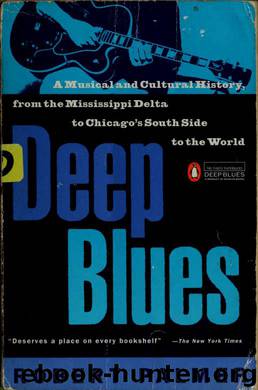Deep blues by Palmer Robert 1945-1997

Author:Palmer, Robert, 1945-1997
Language: eng
Format: epub
Tags: Blues (Music), Blues, Musiciens de blues
Publisher: Harmondsworth, Middlesex, England ; New York, N.Y. : Penguin Books
Published: 1982-01-06T05:00:00+00:00
CHICAGO PEP • 153
I
the outskirts of town and in the country with Walter Horton, a teenage harmonica wizard from northern Mississippi who was to become one of the premier Chicago blues soloists after World War II, and Little Buddy Doyle, a blind dwarf who picked guitar and sang in the streets when he wasn't in a stupor from moonshine, jimson weed, and other intoxicants. "My mind in such a condition till I hardly know the days of the week," Doyle sang in "Bad in Mind Blues," which he recorded, with Horton on harp, in Memphis in 1939.
Sunnyland also worked in West Memphis, Arkansas. "When Mr. Crump cut all that out, everybody starts to get out to West Memphis, and West Memphis had a barrel of blues all the time," he says. "Everywhere you go in West Memphis, there was a gambling joint and honky-tonks. I used to play aU them places. It used to be so muddy in the streets you had to carry hip boots to get around." And he rambled up and down the Mississippi, stopping in the towns that were v^dde open. "Caruthersville [Missouri] was the jumpingest town in the world. Women could hustle and do what they want to do and have protection, you know what I mean? At the sea walls, right 'side the Mississippi River. All them river towns where the boats come in was good." There were also levee camps along the river where the men who labored maintaining the earthworks or sandbagging against the rising current during flood season were usually ready for some entertainment at night. Out in the Deep South's uncut forests, there were lumber and turpentine camps—makeshift towns of unpainted shacks. Sunny-land didn't just play in these camps. He learned to do electrical wiring and fit pipe struts, and sometimes, when money was tight, he would work all week and then play all weekend. But his mind was on his music, which never strayed very far from the basic blues themes he learned in the Delta.
During the early years of his career he was still known as Albert Luandrew. It was in the thirties that he acquired the nickname Sunnyland Shm. At the time, railroads were both the lifeline of the nation and an institution with considerable mythic significance. Southern blacks tended to ascribe personal characteristics to certain trains. "The Sunnyland train," Slim explains, "was a fast train, run right out of Memphis to St. Louis on the Frisco. I started singing about it because, man, it killed peoples. They would be
Download
This site does not store any files on its server. We only index and link to content provided by other sites. Please contact the content providers to delete copyright contents if any and email us, we'll remove relevant links or contents immediately.
The Goal (Off-Campus #4) by Elle Kennedy(12424)
Kathy Andrews Collection by Kathy Andrews(10506)
Diary of a Player by Brad Paisley(6863)
What Does This Button Do? by Bruce Dickinson(5519)
Assassin’s Fate by Robin Hobb(5229)
Big Little Lies by Liane Moriarty(4876)
Pale Blue Dot by Carl Sagan(3995)
Sticky Fingers by Joe Hagan(3449)
The Heroin Diaries by Nikki Sixx(2928)
The Death of the Heart by Elizabeth Bowen(2895)
Beneath These Shadows by Meghan March(2713)
The Help by Kathryn Stockett(2700)
Confessions of a Video Vixen by Karrine Steffans(2668)
How Music Works by David Byrne(2519)
Jam by Jam (epub)(2480)
Harry Potter 4 - Harry Potter and The Goblet of Fire by J.K.Rowling(2413)
Strange Fascination: David Bowie: The Definitive Story by David Buckley(2364)
Petty: The Biography by Warren Zanes(2234)
Darker Than the Deepest Sea by Trevor Dann(2205)
